- Home
- Lissa Evans
Old Baggage Page 2
Old Baggage Read online
Page 2
‘I suppose I could stay another fortnight,’ said Mrs Bowling.
‘No, that’s quite all right,’ said The Flea. ‘I’m sure we can manage without you.’
She had just sat down again – feeling more at ease than she had for days – when the doorbell jangled.
‘The most infuriating thing has happened, Florrie,’ called Mattie, opening the back door and racing up the scullery passage. ‘I was crossing the Heath towards the—’
‘Mattie, we have a visitor.’ There was a warning note in The Flea’s voice. The kitchen door was ajar and through the gap Mattie could see a policeman’s helmet on the table. Its owner, a sergeant, stared at her as she entered the room, and then rose with what felt like deliberate slowness. He had sharp features, and brown eyes that were slightly too close together; a terrier’s face.
‘Miss Simpkin?’
‘Yes.’ She remained standing, her chin up and her knees a little bent. When questioned, imagine you are about to receive a tennis serve; with your senses on the alert, your stance easy and your muscles poised, you’ll be ready to return all shots – with backspin! Behind the policeman, The Flea hovered anxiously, hands clasped.
‘My name is Sergeant Beal. I’m here about an incident at the Heath fairground earlier this afternoon.’
‘Yes, my handbag was snatched from my grasp. Did someone report it?’
‘The incident I’m talking about involved a missile being thrown at a young lady.’
‘No, the missile in question was thrown at the thief. The young lady happened to interpose herself between us. I think you will find there is a considerable difference between these two statements.’
‘Mattie,’ said The Flea, levelly, ‘you are not in the dock.’
‘Nevertheless, I would prefer to keep the facts straight.’
Beal picked up his notepad and, with deliberation, thumbed through to a page of close writing. ‘The young lady claims you threw a bottle at her.’
‘A miniature bottle. Please don’t make it sound as if I lobbed a jeroboam in her direction. A crime had been committed and I was attempting to delay the escape of the perpetrator. The injury to the girl was entirely accidental, not to mention minor, and I apologized profusely. I cannot see why this is a police matter.’
There was a pause. Mattie had the sudden feeling that she had hit a mis-shot.
‘You said that a crime had been committed,’ repeated the sergeant.
‘Yes, my bag was stolen.’
‘Which is most definitely a police matter. And yet you didn’t, yourself, report it.’
‘No.’
‘Why’s that?’
There was a pause. ‘I chose not to. As is my legal right.’
Beal nodded, as if she’d just confirmed something. ‘I gather we’re not too fond of the police, are we, Miss Simpkin?’
‘I – I presume you are using the first-person plural ironically – I infer from your remark that you know something of my history. The question therefore answers itself.’
‘The tea’s ready,’ announced The Flea, brightly and hurriedly. ‘Let’s all sit down together, shall we? Would you like a cup of tea, Sergeant?’
‘Thank you, Miss Lee, that would be most welcome.’
‘Let me clear a space.’ She moved the piles of cards to the window ledge, and took her time about setting out the tea cups, waiting until Mattie had reluctantly taken a seat before she began to pour.
‘Given that I did not report the incident,’ said Mattie, ‘may I ask why and how you arrived on my doorstep?’
‘One of my constables was patrolling the fair, and he came across the injured young lady. She gave a description of the person who had thrown the missile and this description was recognized by the constable in question, who had attended an incident involving yourself last summer.’
‘Which incident?’
‘An argument between yourself and a carter.’
‘Oh, that incident. The fellow was refusing to allow his poor animal to stop for water on the hottest day of the year. All I did was unbuckle the harness and attempt to lead the horse away until such time as—’
‘Mattie.’ The Flea’s tone was like a nudge to the steering wheel; Mattie veered away from the side road and back to the main thoroughfare. ‘As I say, the injury to the girl was quite accidental and not, I think, serious, and my apology was immediate.’
‘The young lady,’ said the sergeant, his voice suddenly hard, ‘looks as if she’s been in a prize fight. She works in the first-class ladies’ cloakroom at St Pancras and says she’s sure she won’t be allowed back there until the injury to her lip has healed. She is thinking of pressing charges.’ He leaned back, seeming to relish the silence that followed. ‘In the meantime,’ he added, ‘could you give me a description of the thief, and also of the handbag?’
‘He was wearing a purple jacket,’ said Mattie, stiffly, ‘and he had dark hair, but I barely saw his face. I can tell you nothing useful about his appearance.’ Though as she spoke, she recollected that glance back; a broad face, sharply cheekboned – almost Slavic; she had been reminded of her Serbian refugees.
‘And the bag?’
‘Black leather. Rather large.’
‘Its contents?’
‘A purse, a 1928 diary, a pair of nail scissors, a fountain pen, a third edition of Fuller’s Worthies of England, volume two …’
‘A large book,’ supplied The Flea, as the sergeant’s pencil hesitated.
‘… an apple, a string bag, a handkerchief, a Jew’s harp and a small wooden—’
Mattie stopped herself just in time.
‘… shoe tree.’
‘And how much is in the purse?’
‘Just over two pounds, but there is also a betting slip which, should Casey’s Bride win the 4.20 at Sedgefield, will yield a further three guineas.’
Beal tucked his notebook and pencil into his pocket and rose to leave.
‘Thank you for the tea, Miss Lee. Miss Simpkin, we may need you to come to the station to give a signed statement. You shall be sent a letter in due course. In the meantime, I’d advise you not to take the law into your own hands. Again.’ He checked his watch. ‘Casey’s Bride?’
‘Three-year-old gelding out of Joe’s Heaven and Penelope. On striking form this season.’
She stayed seated as The Flea showed the sergeant out, and when she heard the front door close she reached for her tea. Her hand was trembling. How ridiculous that a single fairground tune had led to this; for thirty seconds she’d visited Angus, dear Angus, in that dreadful hospital in Weymouth and for that she’d been robbed and threatened with court. Her guard had slipped and the barbarians had come smashing through. Vigilance, she thought, for the second time in as many hours. Vigilance.
‘That poor girl,’ said The Flea, returning.
‘Yes, it was fearfully bad luck for her. For both of us.’
‘Mattie, you could have taken her eye out!’
‘No,’ said Mattie, with certainty. ‘No, I was aiming for the spot between the fellow’s shoulder blades. She would have had to have been frightfully short to be struck any higher.’ She took a deep breath and set her cup down. ‘However, I would rather not be the subject of an assault charge. I wonder …’
‘What?’
‘If the girl might accept payment for days missed at work. Compensation, so to speak. I could go to St Pancras and ask for her address. She’s a redhead, it won’t be hard to describe her.’
‘I could do that,’ said The Flea, quickly. ‘I’ll be working in Somers Town tomorrow, right beside the station.’
‘I don’t mind going.’
‘And neither do I.’ The Flea’s tone was bright but firm. Mattie looked at her companion over the top of her spectacles. ‘You fear I may mishandle the situation.’
‘It’s more that you’re very memorable, Mattie. After all, what we are talking about is …’
‘Bribery.’
‘Yes. Any visitor would need
to be unobtrusive. And don’t forget I often have to raise quite delicate matters with my mothers, topics of discussion that I need to’ – she picked her words – ‘sidle around.’
‘I lack tact.’
‘Yes.’
‘Hmm.’ Mattie gave her eyes a rub. ‘You may be right. In which case, thank you. In the meantime, I urgently need to replace my diary, all my lecture dates were in there – do you have a record of them?’
‘They’re on the new kitchen calendar.’
‘Ah. I wasn’t sure, so directly after the incident I went across the road to the Drill Hall to look at the poster outside and …’
‘A week on Wednesday,’ said The Flea. ‘Seven o’clock.’
‘… and whoever pinned it on to the noticeboard has done so rather carelessly. There is a pleat right down the centre of the paper, eliminating an entire syllable of every line. My lecture is apparently entitled “Some Experiences of a Mint Suffragette”, though I fared rather better than Mrs Gretel Neumann and her daughters, who this week will be giving a demonstration of Traditional Germ Folk Dancing. One for you, I thought, Florrie: you could bring your flit-gun and douse the front rows of the audience with prophylactic Jeyes Fluid.’
There was a moment of silence and then The Flea flushed pink and, almost against her will, began to laugh.
‘Thought that might tickle you,’ said Mattie with satisfaction. She drained her tea and then stood and stretched. ‘A thoroughly irritating day,’ she said. ‘What I need is some violent exercise. I shall walk down to the bookmaker in Camden and see if he’ll honour my mark.’
‘Across the Heath again?’
‘Yes.’
‘Then please be careful. I still don’t understand what happened – was there a struggle, were you injured in any way?’
‘No. I was distracted by something and made myself an easy target.’ Humiliating to think of how she’d been standing, daydreaming like some silly flapper.
‘But distracted by what?’
Mattie shook her head. ‘It really doesn’t matter; it won’t happen again.’ She went to the hall to fetch her cape; it was crisping up for a frost outside.
Twenty minutes later, breasting Parliament Hill in the twilight, she saw a fox trot into the bushes, its mouth crammed with something that struggled. London lay sprawled below, yellow streetlights like a cheap glass necklace, the diamond pin of Venus hanging above. She could hear the jangle of the fair in the distance; the music was still playing, dangerously sentimental, and she took a deep breath and began to sing ‘The Marseillaise’, matching her footsteps to the rhythm of the lines. A spooning couple turned to stare; she nodded at them, pleasantly. People always stared. If one didn’t creep around, if one said what one thought, if one shouted for joy or roared with anger, if one tried to get things done, then seemingly there was no choice but to be noticeable. She couldn’t remember a time when her path hadn’t been lined with startled faces; they were her reassurance that progress was being made. What tremendous luck, she’d often thought, that she’d been born into an era of change. She could not have stood to have been like Dorothea Brooke, deprived of grand gestures, incrementally adding to the growing good of the world.
For work, The Flea wore a plain coat over a blouse and skirt, but her hat had ‘Health Visitor’ embroidered across the band. She exchanged it for a felt cloche in the public lavatory at St Pancras, pausing for a moment between hats to marvel at the shortness of her hair. It hung just below her ears – more of a bob than a shingle (she had rather lost her nerve in the barber’s chair) – but, nonetheless, it was nearly eight inches shorter than before, and the novelty was still delightful. ‘I should think I gain nearly twenty minutes of useful time a day,’ she’d said to Mattie, ‘what with all the washing and brushing and pinning.’
‘It isn’t time that I begrudge,’ remarked Mattie, whose own hair, plaited, had the thickness of a steel hawser, and who harboured a secret suspicion that, like Samson, she might pay physically for its removal; she wore it pinned into a great silver wheel that framed her head.
The Flea’s own hair was limp and fine, dark brown threaded with grey, and the shorter length made her pointed little face appear almost girlish. I shall never grow it long again, she thought, and the idea was quietly thrilling.
The redheaded girl’s name was Ida Pearse. ‘But I’m afraid she no longer works here,’ said the supervisor at the first-class ladies’ cloakroom, mouth pursed, as if balancing a marble on her tongue. ‘She kept getting styes, and that’s not at all nice for our ladies to see, is it? So last week I had to ask her to leave.’
‘Could you tell me where she lives? She … she left her umbrella at our house.’ Even to her own ears this sounded implausible – she had always been a poor liar – but the supervisor was scarcely listening; after one glance at The Flea, her gaze had slid past in search of someone more obviously first class.
‘I couldn’t tell you, I’m afraid. Excuse me.’ She plunged forward with a sudden smile as a customer approached, and The Flea was left standing beside the counter. The waiting room behind it was beautiful: a leaf-patterned carpet, and leather sofas; frosted glass in the window, a central table with a sheaf of magazines and a bowl of potpourri.
In one corner, a girl in a maid’s uniform stood beside a small table, ready to hand out pins, or hairgrips or hand cream. The Flea caught her eye and gave an encouraging smile, and after a moment of hesitation, and a glance across at her supervisor, the girl came over to the counter. She was about fifteen, plump-faced, her eyes like buttons on a pink cushion.
‘Can I help you?’
‘Do you know Miss Pearse’s address?’
‘Miss Pearse?’
‘The redheaded girl who worked here.’
‘Oh, Ida.’ She bit cautiously on the name as though it were an over-seasoned pudding. ‘She had to leave.’
‘I know. Styes.’
‘And cheek.’ The girl glanced towards where the supervisor was pouring a glass of soda water for a customer and then lowered her voice. ‘She corrected one of the ladies.’
‘Corrected her on what?’
‘Geography.’
‘What aspect of geography?’
‘I don’t know. But we’re not supposed to contradict the ladies. I don’t ever,’ she added, complacently.
‘So do you know where I could find Ida?’
‘Wilson Road. She lives with relations. Her auntie takes in ironing.’ The tone was disparaging.
‘A useful service,’ said The Flea, rather crisply, forgetting for a second the need to be unobtrusive, remembering instead her own childhood: two steam-filled rooms, walls pearled with moisture, piles of folded linen which couldn’t ever be touched or even brushed against, so that she and her brother had learned to walk crab-wise, arms pressed to their sides. ‘Thank you,’ she added, turning away from the counter.
She knew Wilson Road well. ‘Black Alley’, it was called by the locals, the bricks thick with railway soot, the thrum of trains audible in the rooms at the front of the buildings, the ceaseless clatter and hum of the Euston Road at the back. ‘He can’t sleep if he can’t hear no traffic,’ one of her mothers had said of her baby. A nice, clean, healthy baby he’d been, in well-scrubbed quarters, while directly outside rats had rustled in a row of lidless bins. On that occasion, The Flea had threatened the landlord with a summons, and new lids had been quickly supplied; you could use the law against the landlords – you could demand a visit to a workshop, request gutters to be mended, walls to be whitewashed, windows to be unscrewed – but to enter a home you needed an invitation. And you never knew until the door was open whether you’d smell carbolic or sour milk, whether the mother would be able and energetic or a weary slattern with a row of ailing offspring, and, if the latter, you could never criticize – only hint, nudge, suggest, interleave tact with sympathy, otherwise you’d never get in again. You were a visitor, and visitors should always be polite.
‘Excuse me. I’m looking for
a lady who takes in ironing. She might be called Mrs Pearse.’
The small boy sitting with his feet in the gutter and a kitten on his lap jerked his head towards a stairwell.
‘Top floor, Miss.’
The Flea was halfway up the stairs when a young girl of fourteen or fifteen came clattering down, a knotted bundle in her hand, a puffed purple smudge on her upper lip, auburn hair visible beneath a cheap beige felt.
‘Ida Pearse?’
The girl ducked her face towards the wall.
‘Who’s asking?’
‘My name’s Miss Lee. I heard about your nasty accident on the Heath and I called to see how you were.’
The girl flicked her a glance and then returned to her study of the brickwork. ‘What do you mean, you heard about it? Are you something to do with the police?’
‘No, I … my friend was inadvertently responsible for your injury.’
‘What, her? The old bottle-chucker?’ Ida turned. The bruise was like an inked-on moustache, vivid against the colourless bread-and-marge complexion, the sparse, pale eyelashes. ‘Sent you to say sorry, has she? Too scared to come herself?’
The Flea managed not to smile. ‘Quite the reverse, I had to persuade her to let me visit. I work in this area, you see.’
‘How did you find me, anyhow?’
‘A policeman called and told us you were worried you’d not be allowed to go in to work, so I went to the cloakroom at St Pancras and …’
Ida flushed. ‘That cow of a supervisor,’ she said. ‘You’d think I got the styes on purpose, you’d think I’d chosen them out of a catalogue. She said it was from the dirt, and I’m as clean as Christmas, I bet I wash more than her. So you going to tell the police I was lying then, and I’d already been sacked?’
‘Of course not.’
The girl gnawed at her lower lip, indignation fading. ‘I don’t even know why I said it.’
‘You were upset and shocked, I’d imagine. Did you try bathing your eyes with borax?’
‘Are you a nurse?’
‘A sanitary inspector and health visitor.’
‘Salt water, I tried. I boiled the water first.’

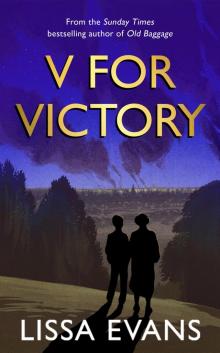 V for Victory
V for Victory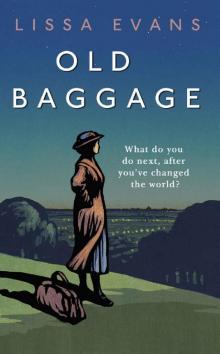 Old Baggage
Old Baggage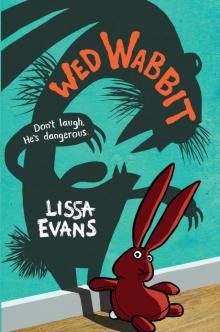 Wed Wabbit
Wed Wabbit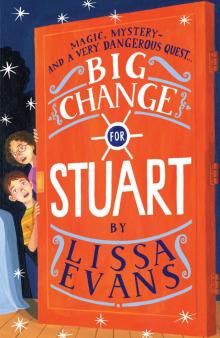 Big Change for Stuart
Big Change for Stuart Spencer's List
Spencer's List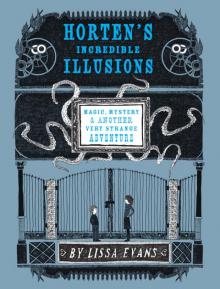 Horten's Incredible Illusions
Horten's Incredible Illusions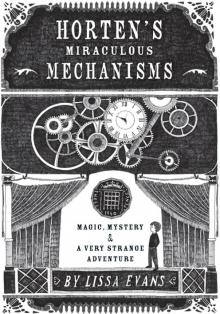 Horten's Miraculous Mechanisms
Horten's Miraculous Mechanisms Their Finest Hour and a Half
Their Finest Hour and a Half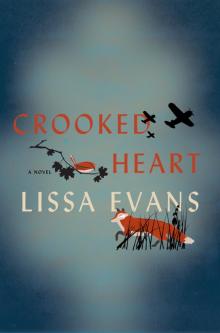 Crooked Heart
Crooked Heart